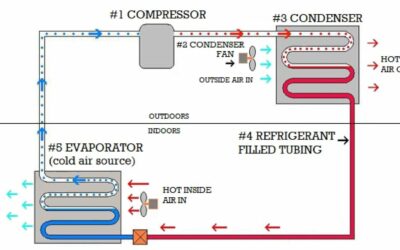There are a few reasons air conditioners may freeze in hot weather. One is that the air conditioner is overworked and can’t keep up with the demand. This is more common in areas where there are large temperature swings from day to night or where the air conditioner is not large enough for the home. Another reason air conditioners may freeze is because of a leak in the system. A refrigerant leak will cause the air conditioner to run longer than usual in an attempt to cool the home, which puts extra strain on the system and can cause it to freeze over. Preventing this problem is as easy as scheduling routine air conditioner maintenance. An experienced technician will be able to identify the problem and fix it before it becomes a larger issue.
On a hot day, it may seem counter-intuitive that your air conditioner could freeze over. However, it is more likely to occur on hotter days than in any other weather. systems are actually more prone to freezing during hot weather. Why does this happen and what can you do to avoid this from happening and keep your home cool? Our blog will explore this topic in depth, including why air conditioners freeze and a few easy tips to stop it from happening.
Problems Arise When You Need Your AC the Most
Air conditioners freeze over during the summer more frequently than any other season because (surprise) they’re used more when it’s hot outside. However, proper maintenance is important to ensure your system is in good condition before extensive use. The shape the air conditioner is in will affect whether or not your air conditioner will freeze.
The long piece of metal tubing inside of your air conditioner, also known as a coil, contains a freezing-cold fluid called refrigerant. The purpose of refrigerant is to absorb heat from the air that passes over the metal tubing. Over time, dirt and grime will build up on the surface of your coil which acts as a thin insulator between the heat and the transfer process. If there is too much build-up then your refrigerant won’t be able to absorb enough heat and reach its expected level. The result is that it sits at a temperature below freezing, and any water vapor that collects on the coil as part of the cooling process then turns to frost. If enough frost builds up, the heat transfer stops completely, and eventually, your air conditioner needs to shut down entirely because it can’t operate anymore.
What Causes Your Air Conditioner to Freeze?
It’s quite unusual for an air conditioner to freeze over, so what might be the cause of this problem? Most systems are able to function perfectly even during hot and humid weather. There are two probable reasons why an AC would freeze over: an absence of airflow and/or a dirty coil.
- As we stated earlier, a dirty coil won’t absorb heat as well as a clean one would. A dirty coil will cause the refrigerant flowing through it to always be below freezing temperature. When air full of water vapor (which is common on hot summer days) passes over the cold coil, it quickly condenses and freezes into ice. The more vapor that hits the coil, ices faster and creates an effect where your AC slowly starts to freeze over time.
- The second factor is the air flowing over the coil. Your coil needs to absorb a certain amount of heat so that ice and frost can’t form on the refrigerant. The coil can’t absorb heat if the airflow is inhibited by a faulty blower fan or a dirty air filter. The biggest contributor to weakened airflow (and also a dirty coil) is not changing your air filter often enough. If you don’t change your air filter regularly, it will restrict the flow of air over the coils.
How Can I Prevent the Air Conditioner From Freezing Over?
First, You can increase your energy efficiency and prevent potential cooling issues by starting the warm season with a clean air conditioner coil. To do this, we recommend calling a professional. If you would like to do it yourself, read the service manual, shut off the power to your system, open up the door, and scrub any dirt or debris that has accumulated on the coil.
Second, your air filter needs special attention during the blistering days of summer. To make certain your system is efficient, replace the filter at the very beginning of summer. Then check it each month; you’ll be amazed how quickly a filter gets grimy from daily use.




